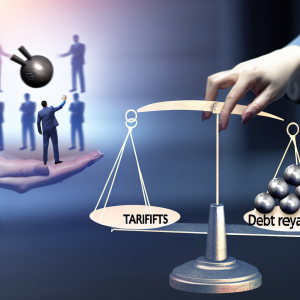As tariffs reshape the economic landscape, Americans are feeling the squeeze—not just at the checkout line but in their wallets as they struggle to manage debt. Recent data exposes a growing concern: 78% of U.S. workers believe that tariffs imposed under President Trump’s trade policies are making it harder to pay down their debts. This sentiment, revealed by a Zety survey of over 1,000 employees, underscores a broader financial challenge that investors and advisors can’t afford to overlook.
Tariffs: The Hidden Tax on Everyday Life and Debt
Tariffs, essentially taxes on imported goods, are more than just a geopolitical bargaining chip—they translate directly into higher costs for consumers. According to a Yale University Budget Lab report, tariffs could add an average of $2,000 per household by 2025. This isn’t just a number; it’s a real financial burden that tightens household budgets and complicates debt management.
But here’s the kicker: tariffs are also influencing monetary policy. The Federal Reserve, led by Chair Jerome Powell, has kept interest rates steady partly due to the economic uncertainty tariffs create. Powell himself acknowledged that without tariffs, the Fed might have lowered rates this year, which would have eased borrowing costs. Instead, credit card rates hover near record highs, with an average APR of 24.33%, according to LendingTree.
For investors and financial advisors, this means a dual threat: rising prices and persistently high borrowing costs. The combination can stifle consumer spending and slow economic growth, impacting everything from stock market performance to bond yields.
What Investors and Advisors Should Do Differently Now
-
Prioritize Debt Management in Client Portfolios
High-interest debt is a silent portfolio killer, especially when economic uncertainty looms. Advisors should encourage clients to tackle credit card debt aggressively, focusing on reducing high-interest liabilities before reallocating funds to riskier investments. -
Leverage Low-Interest Alternatives
Consider refinancing strategies for clients burdened by credit card debt. Personal loans with average APRs around 11-12% (per Federal Reserve and National Credit Union Administration data) can offer relief. For those with good credit, 0% balance transfer cards remain a powerful tool—though qualifying requires a credit score of 690 or above. -
Build Emergency Savings as a Hedge
With economic volatility heightened by trade tensions, liquidity is king. Clients should be encouraged to build or maintain emergency funds that cover at least 3-6 months of expenses, cushioning against unexpected financial shocks.
A Unique Insight: The Tech Sector’s Silent Impact
While tariffs predominantly affect consumer goods, investors should watch the tech sector closely. Many tech companies rely on complex global supply chains susceptible to tariff disruptions. For example, Apple has faced increased costs on components sourced internationally, which could pressure profit margins and stock valuations. This ripple effect is often overlooked but critical for portfolio risk assessment.
What’s Next? Forecasting the Financial Terrain
Looking ahead, tariffs are likely to remain a tool in trade negotiations, keeping economic uncertainty elevated. The Federal Reserve’s cautious stance on interest rates suggests borrowing costs won’t significantly drop soon. Investors should brace for a period where inflationary pressures from tariffs and steady interest rates coexist, challenging traditional investment strategies.
Advisors must stay nimble, incorporating debt reduction strategies and liquidity management into their financial planning. For investors, focusing on sectors less vulnerable to tariff shocks—such as domestic services and renewable energy—could provide safer harbor.
Final Thought: Actionable Steps for Today
- Negotiate with lenders: Don’t hesitate to ask for lower APRs; many lenders are willing to negotiate, especially for clients with good credit.
- Explore 0% balance transfer cards: Use these strategically to minimize interest payments, but be mindful of fees and qualification criteria.
- Consider personal loans: Use them to consolidate high-interest debt, but weigh the fixed payment commitment carefully.
In a world where tariffs and trade wars shape financial realities, mastering debt management isn’t just prudent—it’s essential. Stay informed, act decisively, and protect your financial future amidst the evolving economic landscape.
Sources:
- Yale University Budget Lab Report, June 2024
- Federal Reserve Consumer Credit Data, 2024
- LendingTree Credit Card Market Analysis, 2024
- National Credit Union Administration Loan Rate Data, 2024
By integrating these insights, Extreme Investor Network readers gain a competitive edge—turning economic challenges into opportunities for smarter, more resilient investing.
Source: How Trump tariffs may affect debt repayment: survey

